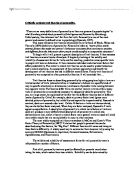Compare and contrast Piaget's and Vygotsky's views of cognitive development.
Compare and contrast Piaget's and Vygotsky's views of cognitive development. Cognitive development is the growth in our capabilities as learners. Cognitive development theory attempts to explain how humans acquire and construct knowledge of themselves and their world. The first systematic theory of cognitive development was proposed by Jean Piaget, however there are other major theoretical approaches to cognitive development, including those of Vygotsky. Piaget approached the subject from a biological, nature, perspective, whereas Vygotsky approached the subject from an environmental, nurture, perspective. This leads to major differences in their theories regarding the way in which we learn and the importance of certain aspects such as language on cognitive development. Piaget's theory focuses on the organisation of intelligence and how it changes as children grow. Whereas Vygotsky's theory centres around the social process and he defines intelligence as the capacity to learn from instruction. We will also look at the impact both men's theories have had on education and how they have been applied to education. For better or worse. We will, therefore, look at these differences along with others, as well as the similarities of Piaget's and Vygotsky's theories and compare and contrast them. Both Piaget and Vygotsky were influenced by the evolutionary implications of Darwin's
Evaluate the claim that Person-Centred Therapy offers the therapist all that he/she need to treat the clients
Chrysalis Counselling CourseModule 1Krisztina Paladi-Kovacs July 2012 “Evaluate the claim that Person-Centred Therapy offers the therapist all that he/she need to treat the clients.” In this essay I will define what Person–Centred Therapy (PCT) is and I will look at the origins of this therapy with particular reference to Abraham Maslow and Carl Rogers and examine the fundamental elements necessary for the therapy to be seen as patient centred. I will compare the benefits and disadvantages of Person-Centred Therapy and try to establish whether a therapist can treat all clients effectively using just the one approach or whether it is more beneficial to the client for the therapist to use a more multi-disciplinary approach. To be able to discuss this subject, it is important to describe first what we mean when discussing PCT. Person-Centred Therapy, also known as client-centred, non-directive, or Rogerian therapy, is an approach to counselling and psychotherapy that places much of the responsibility for the treatment process on the client, with the therapist taking a non-directive role. PCT emphasises person to person relationship between the therapist and client and focuses on the client’s point of view; through active listening the therapist tries to understand the client’s present issues and emotions. In PCT the client determines the direction, course, speed






